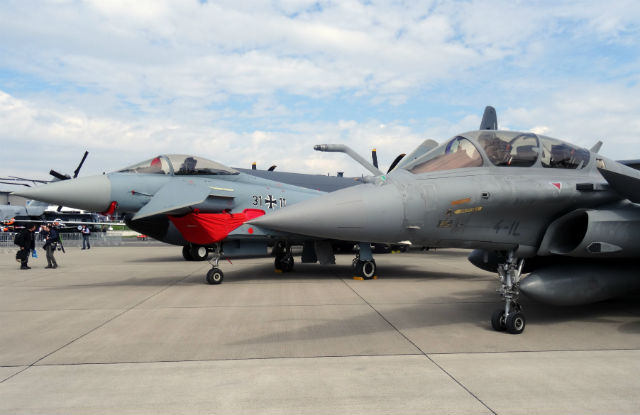Airbus Defence & Space and Dassault used the opening day of the ILA Berlin air show to advance their planned collaboration on the development and production of a broad-reaching future combat air system (FCAS) capability.
Describing the step as "a landmark industrial agreement to secure European sovereignty and technological leadership in the military aviation sector for the coming decades", the pact will seek to create a successor for the Eurofighter and Dassault Rafale fighters currently operated by Germany and France, respectively. The partners envision a replacement "system of systems" as being available from the 2035-2040 timeframe.

Craig Hoyle/FlightGlobal
“Never before has Europe been more determined to safeguard and foster its political and industrial autonomy and sovereignty in the defence sector," says Dirk Hoke, chief executive of Airbus Defence & Space. Noting that the companies are already collaborating on the European medium-altitude, long-endurance (MALE) remotely piloted air system project, he adds: “FCAS takes this successful co-operation to the next level and we are absolutely committed to tackling this challenging mission together with Dassault Aviation."
Hoke adds: "The schedule is tight, so we need to start working together immediately by defining a joint roadmap on how best to meet the requirements and timelines to be set by the two nations." The partners are calling on Berlin and Paris to "launch an initial joint study this year to address this task”.
"Both companies fully intend to work together in the most pragmatic and efficient manner," says Dassault chief executive Éric Trappier. "I am convinced that European sovereignty and strategic autonomy can and will only be ensured through independent European solutions."
Trappier describes the joint FCAS proposal as a bold vision, which also "is an important signal in, and for, Europe. The programme will strengthen the political and military ties between Europe’s core nations and reinvigorate its aerospace industry”, he says.
Announced on 25 April, the joint activity includes proposals to develop demonstrators from 2025 in support of the FCAS programme. They cite likely elements as including a next-generation fighter and MALE UAV, plus advanced cruise missiles and other UAVs capable of operating in swarms, all supported by communications equipment and satellites.
Pointing to potential wider participation in the initiative, the companies say they "agree on the importance of efficient industrial governance in military programmes. This also includes the involvement of other key European defence industrial players and nations, based on government funding and on the principle of best contribution".
Source: FlightGlobal.com


























